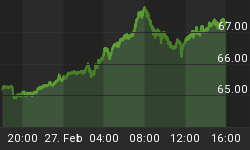The extraordinary gains in the Chinese real estate market may be coming to an end. In fact, there are several indications that the property market bubble is topping and that the measures instituted by the Chinese Government to slow down the property market will be effective. Although the Chinese infrastructure boom is often cited as the underlying reason for the global growth story, industrial commodities and many global stock markets are ignoring the threat of a slowdown in China.
The Shanghai Property Developer Index (Bloomberg Code: SHPROP) measures the performance of the 33 largest property companies of the Shanghai Composite (Figure 1). The 5-year chart depicts a classic deflating bubble that burst in 2008 after rising 10x from 2005 to 2008. Following the reflexive bounce from late 2008 thru July of 2009, the index has dropped 40% to 3,675 today.
Figure 1. Shanghai Property Index
Source: Bloomberg
Despite the decline in Chinese property stocks, Chinese property prices have continued to rise (Figure 2). Even though prices dropped slightly during the 2008 financial crisis, price gains quickly resumed and prices are now 60% higher than they were just 3 years ago.
Figure 2. National Property Prices for China (RMB/sqm)
Severe price increases alone do not signal the top of a bubble. However, China's property boom has been fueled by a tremendous amount of debt, and if loan growth slows even slightly, prices can quickly tumble. The rapid growth in residential mortgage loans (Figure 3) and property developers' loans (Figure 4) suggests that the Chinese real estate boom is likely to end when loan growth slows.
Figure 3. Residential Mortgage Loans
Figure 4. Property Developers' Loans
Finally, housing affordability (Figure 5) has declined to unsustainable levels. Although the national average of home price affordability is reasonable, prices in major cities such as Shanghai, Shenzhen and Beijing are extremely stretched. In those cities, mortgage payments are greater than 80% of annual income.
Figure 5. Mortgage Payment/ Annual Income: Four Major Cities
Nobody can predict when a bubble will pop. However, the recent measures and comments by Chinese officials clearly indicate their intentions to cool the market. For instance, on April 15, 2010, Chinese central bank adviser Li Daokui stated that the surging property market is having its "last madness" and that speculators "don't realize how strong and resolute the political will is among top leaders to curb price gains."¹ Among other new measures, China has curbed loan growth to buyers of second and third homes and has suspended lending to buyers who cannot provide tax returns or proof of social security contributions.
Easy money and a surge in mortgage lending has fueled a real estate bubble in China. Home prices are no longer affordable for the average citizen in major Chinese cities, and the Chinese Government is taking steps to slow the market's momentum. The decline in the Shanghai Property Developer Index indicates that the market believes that the Government's measures will succeed, yet commodities and other financial markets have largely ignored the policy changes. Perhaps investors will soon pay closer attention to the risk that the Chinese real estate market poses to the global growth story.
¹ http://www.chinapost.com.tw/china/business/2010/04/19/253081/Chinas-rules.htm















